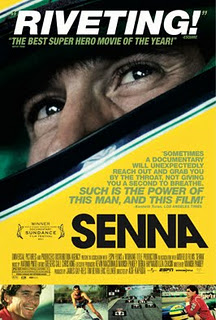A documentary about a race driver who most Americans know nothing about is a tough enough sell for a critic – selling a documentary about a race driver who even most American auto racing fans know nothing about is damn near impossible. But even if NASCAR fans couldn’t care less about the European-dominated sport of Formula 1 racing, anyone watching Senna (playing at the Kentucky Theatre) will find it hard not to for at least 106 minutes.
That’s because director Asif Kapadia a fascinating subject in the spectacular rise and tragic demise of Ayrton Senna, a Brazilian driver who ascended to all-time-great status in F1 racing thanks to a recklessness that would make Ricky Bobby blanch. Largely due to his ultra-devout faith, Senna had a fearlessness that took him to multiple world championships even in cars that were mechanically inferior to the competition – his most famous victory came when he refused to stop racing after a mechanical failure left his car stuck in its highest gear. He also managed to rise above a sport riddled with political machinations – the F1 Chairman who made multiple outrageous referee calls against him happened to be a good friend of his long-time nemesis Alain Prost – but his own inability to ever slow down would catch up with him.
Kapadia avoids the endless-talking-head syndrome of most documentaries by creating a film consisting entirely of archival footage and stitched together with audio recordings of Senna and those who knew him. The footage speaks more eloquently than any narrator could: point-of-view race footage conveys the terror of Senna’s risk-taking, while interview footage reveals a confidence that allowed him to turn a reporter into a soon-to-be-girlfriend on-air. But the film’s greatest moment comes after that race trapped in top gear. Senna could barely move his arms – the effort of keeping the car on the track sent them into muscle spasms – but he forced himself to strain and lift his trophy above his head anyway. A screenwriter might scoff at the tidiness of that all-encapsulating moment, but it’s improbably and gloriously true.








